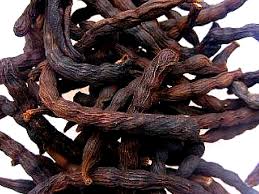Uda is the igbo name for Negro Pepper, (Xylopia Aethiopica), known as Chimba in Hausa, Eeru alamo in Yoruba (because the fruit opens to discharge the seeds when ripe), other names of this plant include; hwentia, grains of Selim, Ethiopian pepper and African grains of Selim.
Uda is a multipurpose tree that is very important in the local economies especially in West Africa, supplying foods, a wide range of medicines, and wood. It remains an important traded plant species throughout parts of Africa, sold in local markets as a spice and medicine. The dried fruits of Uda (Xylopia aethiopica) are used as an herbal medicine. The tree is often cultivated near villages and often protected when growing in the forest.
Uses and Health Benefits of Uda
This spice is used for its aromatic crisp flavour, it has a slight bitter taste and could be peppery especially if you bite into the seeds. Uda possesses great nutritional and medicinal values and all the parts are very useful medicinally, although the fruits are most commonly used for therapeutic purposes. It can be taken as a decoction, concoction or even chewed and swallowed for the management of various aches and pains.
Uda is used in the treatment of a number of diseases including cough, malaria, constipation, uterine fibroid, and amenorrhea. It is also used locally as carminative, stimulant and adjunct to other remedies for the treatment of skin infection. According to Sources, it’s unique nutritional value to the human body includes Copper, zinc, protein, camphene, manganese, Alkaloids, Diter penic, Limonene, Folic acid, Flavanoid, Vitamins: A, B1, B2, C and E which help the body to fight a lot of diseases. Some of the health benefits of uda include the following, and it must be used often, in order to continuously get the raw health benefits from it.
1. As Anti malaria medicine
Uda is used by herbal medicine practitioners to fight malaria, due to its anti- malaria property, it has proven to be one of the best local remedy for malaria. According to a study published in parasitology research, Xylopic acid from uda possesses curative and prophylactic properties on plasmodium berghei-induced malaria as well as antipyretic properties. It is therefore an ideal antimalarial drug candidate.
2. Natural Antibiotic
Uda also has antimicrobial properties which helps it to fight against microbial invasion of the body. Among the conditions treated with Negro peppers in traditional medicine are cough (fruits and roots) bronchitis, dysentery and biliousness (fruits and stem bark) and boils and sores (leaves and bark). According to a study published in African Journal of Traditional Complementary and Alternative Medicine, the oils of the fruits, leaves, stem and root barks of uda contribute significantly to the antimicrobial properties of the plant parts, and give credence to the use of these parts in the treatment of the disease conditions cited above. However uda does not have effect on Escherichia coli one of the most frequent causes of many common bacterial infections, including cholecystitis, bacteremia, cholangitis, urinary tract infection (UTI), and traveler’s diarrhea, and other clinical infections such as neonatal meningitis and pneumonia.
3. Boost Post Natal Milk Production and Appetite
Women in Nigeria and Africa find this plant very useful in clearing blood clots in the womb after delivery, it also help boost their appetite and production of milk after child birth. The results from a study published in the Research Journal of Pharmaceutical Dosage Forms confirm the traditional believe that the plant Xylopia aethiopica (Uda) stimulates lactogenesis (milk production after giving birth). It therefore suggests that the prolactin level induced by this plant can suppress the ovulatory cycle and contribute to many factors inhibiting pregnancy at early stage of birth.
4. Post Natal Analgesic
The consumption of uda by women who just delivered, also helps to facilitate healing of wounds in the womb and recovery process. According to a study published in the African Journal of Biotechnology, Xylopia aethiopica fruits may be helpful in the maintenance of the integrity of the cellular membranes. The lipid extract of the plant exhibit a prostaglandin synthetase substrate activity, whereas the methanol extract enhanced the synthesis of prostaglandins using X. aethiopica oil as substrate. The prostaglandins are a group of lipids made at sites of tissue damage or infection that are involved in dealing with injury and illness. They control processes such as inflammation, blood flow, the formation of blood clots and the induction of labour.
5. Rich Source of powerful Antioxidant
Antioxidants are compounds that inhibit oxidation. Oxidation is a chemical reaction that can produce free radicals, thereby leading to chain reactions that may damage the cells of organisms. The antioxidant properties in uda prevent and destroy the growth of cancer cells. A study which analyzed the composition and antioxidant property of the plant revealed that beta-Pinene was predominant in all cases, while trans-m-mentha-1,8-diene was the main compound in the essential oils of the leaves and the barks of roots and stems. Their potential antioxidant activity was also investigated and found to be significant in scavenging superoxide anion radical.
6. Eases the pain of Rheumatism
Rheumatoid arthritis is an autoimmune disease that can cause joint pain and damage throughout your body. The joint damage that RA causes usually happens on both sides of the body. So, if a joint is affected in one of your arms or legs, the same joint in the other arm or leg will probably be affected, too. Uda also has an anti-inflammatory properties that helps to combat rheumatism. SEE: Renerve Plus Tablet: Uses, Side effects and Price in Nigeria
Side Effects of Uda (Negro peppers)
Male Infertility
Uda has a negative effect on sperm count and reduction in motility which may lead to secondary infertility. According to a study in the international Journal of Scientific Research, prolonged intake of Xylopia aethiopica can lead to reduction in sperm count and reduction in motility which may lead to secondary infertility. SEE: Effect Of Bitter Leaf On Sperm Quality And Quantity
Toxic to the Liver and Kidney
The liver and the kidneys are some of the most essential and hardworking organs in the body. They carry out numerous functions such as excretion of waste, metabolism of many substances, hormonal regulation, and proper digestion, as well as proper coagulation. Research has shown that despite its many beneficial effects uda can be toxic. Findings from a study revealed that aqueous extract of Xylopia aethiopica (Negro peppers) possess some toxic effect on the liver and kidney. Indiscriminate ingestion of the extract of Xylopia aethiopica should be avoided.
Uda Can Cause Abortion and Negatively affect Menstrual Periods
The menstrual cycle is the hormonal process a woman’s body goes through each month to prepare for a possible pregnancy. Regular menstrual periods in the years between puberty and menopause are usually a sign that your body is working normally. Irregular or heavy, painful periods are not normal. Uda can alter the normal pattern of a woman’s monthly flow. According to research, alterations in the estrous cycle, specifically, with prolonged diestrus, reductions in ovulation levels and implantation, as well as, abortifacient effect. Dietary Xylopia aethiopica could be a good candidate for consideration as an oral contraceptive agent. Read: Can A Pregnant or Breast feeding Woman Take Lonart





